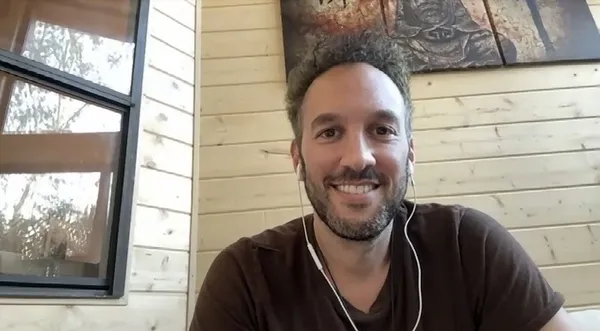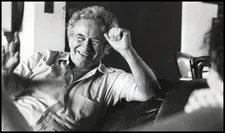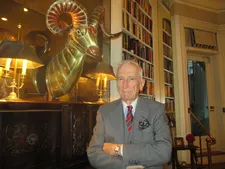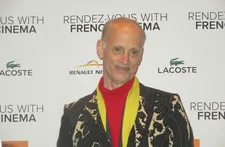 |
| How To Come Alive With Norman Mailer director Jeff Zimbalist: “I lament that in some ways the film is a nostalgia piece for that bygone era. But never saying that Mailer himself is a role model.” |
In the second instalment with Jeff Zimbalist on How To Come Alive With Norman Mailer (co-written with Victoria Marquette and a highlight of the 14th edition of DOC NYC) we discuss a bygone era where opposite sides were coming together in debates, such as the infamous 1971 Town Hall event in New York City: A Dialogue on Women’s Liberation with Germaine Greer, Betty Friedan, Susan Sontag, Jill Johnston, Diana Trilling, Cynthia Ozick, Elizabeth Hardwick, and Jacqueline Ceballos, where Mailer was taught a lesson or two (seen from Chris Hegedus and DA Pennebaker’s Town Bloody Hall documentary), and the Gore Vidal Norman Mailer showdown on The Dick Cavett Show.
 |
| Jeff Zimbalist on Norman Mailer: “He’s incredibly prophetic.” |
From Los Angeles, Jeff Zimbalist joined me on Zoom for an in-depth conversation on How To Come Alive with Norman Mailer.
Anne-Katrin Titze: The first advice your film explores is “Don’t be a nice Jewish boy” and the last one is about being “willing to die for an idea.” So you also have a chronological order of things in that way.
Jeff Zimbalist: Exactly. That’s very observant. I love that you caught on to that. There were some liberties taken with some of the chapters, as far as the ordering of things. Often when events in his life took place over many years, we were overlapping certain things. But we felt it was cleanest if we kept it generally in the chronological order. That way you get to see him mature. You see the most brazen Mailer, who stabs his second wife towards the earlier chapters, become this much softer, more self-deprecating Mailer toward the end.
AKT: You quote Mailer that: “We’re flattening out people’s spirit, deadening the senses of people.” It was a long time ago that he died, and it’s so relevant now.
JZ: He’s incredibly prophetic. He prophesied so many things. The one you just mentioned is a big one, right? There was a heyday of the public intellectual where Mailer thrived, where you could be contrarian, a provocateur, an agitator, and that was considered a noble contribution to our culture and society. There was town-hall debates and idea sparring through essays and interviews. And it was all seen as part of the effort to elevate our consciousness as a people, as a species.
 |
| Gay Talese calls Norman Mailer “deliciously reckless, romantically reckless.” Photo: Anne Katrin Titze |
And now, as Mailer prophesied, talk shows have turned into echo chambers and divisive ideas. Everyone’s in their lane, much less tolerant of ideas that don’t agree with their own. As Mailer would say, we’ve lost the ability to think for ourselves. Books have lost out, technology has created this very fragmented impatience, where information is given to us in these small bite-size capsules and we’ve lost our willingness to engage with complex ideas. And in doing so, as you said, we flattened ourselves out.
We flattened out our spirits. And Mailer is as provocative as ever in his embracing of the ego as the way to sort of punch back at technology’s desire to flatten us and to make us dormant and voiceless. And to allow our egos to be the fire that fuels our momentum in fighting back against it is a very controversial way of looking at the ego. He does a lot of that with psychology and Freud. At the very least it forces us to think outside of some of the assumptions we’ve lived with and at the very most it creates a dialogue that moves us forward.
He talked a lot politically about how political correctness was on the rise to a point where eventually it would become Left totalitarianism. And it would essentially stranglehold our liberties and censor us. We’re seeing that with cancel culture and woke culture in this debate right now. His analysis of so many things has come true. In some ways it’s a compliment to the depth of his thinking, his willingness to look ahead. In other ways it’s tragic that so many of these things have happened.
That was part of why I was attracted to the project when I was approached by the family. His centennial is this year - so he would be 100 and there’s no question that if he was alive, he would want to be used to try to popularise the bygone era of intellectuals and great minds informing the masses, rather than celebrities and TV personalities. This felt like an opportunity to do that. And for me to go back to the days when books were what informed my process.
 |
| John Waters calls some of Norman Mailer’s filmic output: “Reality TV before Reality TV.” Photo: Anne Katrin Titze |
AKT: It was nice to see the footage of Mailer versus the Feminists. It’s so civilised and there’s so much humour in the debate. Although they have very different ideas - but there’s Betty Friedan and Germaine Greer and Gloria Steinem having an actual discussion with Mailer. I love the moment when Susan Sontag explains to him that calling someone “lady” to their face is patronising!
JZ: Yes, ha! It’s amazing. These town-hall debates were opposite sides coming together, both sharing the goal of advancing the conversation. And nowadays debates are incredibly combative. Often the personalities eclipse the ideas and people are in these echo chambers, consuming ideas that agree with their own, rather than taking it public like that. I really miss that.
On the other hand it’s also important to point out that he also got carried away. Mailer with Gore Vidal on The Dick Cavett Show became no different from some of the sparring, jousting, aggressive, sort of violent TV pundits of today. Sometimes he got it right and was exemplary and sometimes he got it very wrong.
AKT: I mean “Miller, Mailer, Manson man” is pretty bad, but yes…
JZ: I’m not advocating that Gore Vidal has it down either!
AKT: Once, with all the good archival footage, I think you undermine your own argument. When your film talks about post-war 1950s and the TV as the centerpiece. And there’s the question: Would you rather watch politics or I Love Lucy, while you show that incredibly funny clip of the gigantic bread coming out of the oven. Most people would say they’d rather watch Lucy!
 |
| Norman Mailer meeting his comeuppance at the Town Hall A Dialogue on Women’s Liberation debate |
JZ: That’s the choice we all make often when we’ve had a tiring day. I’d rather watch the brainless entertainment than to force myself to wrap my head around complex thoughts. We’ve lost today and the escapism of the Fifties, we’ve increasingly lost our tolerance, our willingness, our enthusiasm for engaging with long intense works.
And Mailer’s books sometimes are in excess of 1000 pages. Can you imagine asking people to engage with the level of dense idea that Mailer presents in those books today? It just seems like such a thing of the past. I lament that in some ways the film is a nostalgia piece for that bygone era. But never saying that Mailer himself is a role model - something we made sure to stay away from.
AKT: Even The New York Times is telling you that something is a five-minute read, or a two minute one. What good does that do me? Am I competing with someone who can do it in one?
JZ: Yeah, right. Totally. Attention-span culture has no end. It’ll get shorter and shorter and shorter until the longest thought we are willing to consume is a meme. I think Mailer had his finger on that. I don’t know the answer to get people enthusiastic about complex ideas again. The film, I hope, brings that debate, our love-hate relationship with these ideas to the forefront.
Read what Jeff Zimbalist had to say on the Norman Mailer/Matthew Barney film connection; the interviews with Gay Talese and Mailer’s sister Barbara Wasserman; John Buffalo Mailer and Susan Mailer’s involvement in getting the project started, and becoming an executive producer of Frédéric Tcheng and Bethann Hardison’s Invisible Beauty.





















